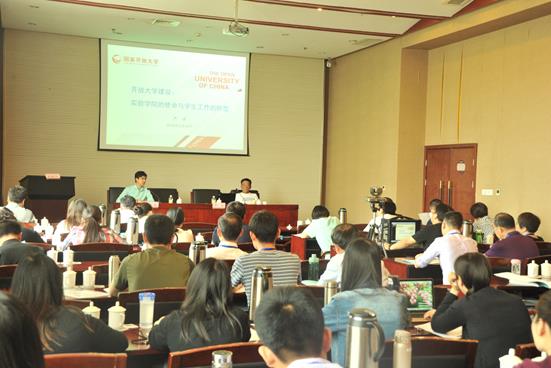 To strengthen the management and teaching teams at the experimental schools of the Open University of China (OUC), promote communications, and upgrade the skills of staff and teachers in branches and learning centers, an advanced workshop was held in Beijing from May 14- 18. More than 50 teachers from the Nanhai, Taiyuan and Dabieshan Experimental Schools, as well as the branches and learning centers attached to them, attended the workshop and received training there.
To strengthen the management and teaching teams at the experimental schools of the Open University of China (OUC), promote communications, and upgrade the skills of staff and teachers in branches and learning centers, an advanced workshop was held in Beijing from May 14- 18. More than 50 teachers from the Nanhai, Taiyuan and Dabieshan Experimental Schools, as well as the branches and learning centers attached to them, attended the workshop and received training there.

This one-week workshop offered management and teacher training by way of lectures, discussions of cases, and sharing of experience. Special reports were given by former OUC vice president Yan Bing, Professor Zhang Li from the Institute of Psychology of the Chinese Academy of Sciences, vice secretary Deng Bing of the Nanhai Experimental School CPC Committee, vice directors Tian Suxia and Cheng Gang of the OUC Learner Support and Teacher Development Center, Ms. Yin Zhiying from the OUC School of Agroforestry and Medicine, and Cui Rui, a highly-rated teacher from the Shijingshan Branch of the Beijing Open University. The reports dealt with the missions of the experimental schools and changes to study tasks, self-assessment in terms of dealing with pressure and gaining fulfillment, thoughts on the study tasks involved in open education at the OUC, and changes to learner support in the “six-network integration” model. Ideas about study tasks and learning-support innovations were covered, and the content of the training was highly practical in its orientation.
At the workshop closing ceremony, 5 student representatives, including Luo Yongchi, spoke about what they had learned. Secretary Liu Xianghong of the Discipline and Inspection Commission of the OUC CPC Committee, director Zhang Luanqiao of the Learner Support and Teacher Development Center, and vice president Li Xinhui presented the students their certificates.

The students said that they had not only gained both a theoretical grounding and practical skills, but also made friends with teachers at other schools and strengthened their group coherence. Furthermore, making these connections would allow innovations to be implemented in a way that was consistent from school to school.
By Wang Guang, OUC